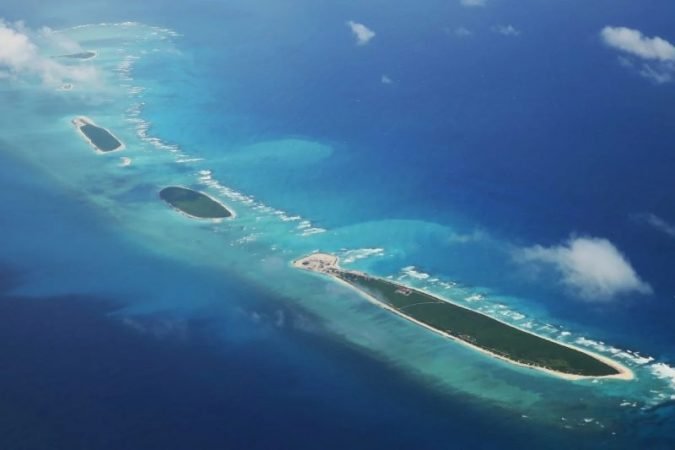South China Sea: Legal and Politico-Economic Salience

The occupation of a political territory has always been a deciding factor in the international arena. Wars are fought, treaties are made, and peace is established and repeat. In recent times, the international confrontation on the South China Sea is a harbinger for that repetition. China’s “historical claims” and the “legal claims” of countries including the Philippines, Vietnam and Malaysia led to a politico-economic battle at the United Nations. The verdict of a tribunal decided the matter in favour of the Philippines and this was naturally condemned by China. The startling instance was China’s firm denial to follow the verdict.
In this article, the author tries to analyze and understand the traction between the United Nations Convention on Law of Seas (UNCLOS) and China’s legal stand. This piece also discusses the salient verdict of the tribunal and how it paved new roads to become “masters of waters”.

UNCLOS and the South China Sea
UNCLOS, which came into force in 1982 after having profound discussions with 160 nations, is a comprehensive document defining the oceanic periphery of a nation with clear definitions on territorial claims, Exclusive Economic Zones (EEZ), contiguous zones and all the other zonal areas.
The EEZs are more concerned with economic rights and that’s why UNCLOS makes it explicitly legal for any foreign state to carry on maritime scientific trade in the EEZ of another state. However the latter holds the sovereignty over all the commercial pursuits. Although the permission of maritime research was given looking into the innovative factor the seas offer, it became a new tool to intimidate by the excessive military presence by a foreign state. For instance, China has consistently lamented the US military presence in the South China Sea. This is not the only intricacy in the sea; it offers certain serious conundrums.
One such conundrum is regarding the nature of the dispute. Article 121(3) of UNCLOS states that: “Rocks which cannot sustain human habitation or economic life of their own shall have no exclusive economic zone or continental shelf”. This was noted in the 2016 verdict that “no land feature in the Spratlys, or Scarborough Shoal, is capable of sustaining human habitation or economic life of its own” and therefore none of them could be regarded as an “island”. Every state wants to encompass more territory given the incentive it gets in the form of EEZ and that’s why all the claimants of the South China Sea dispute want it to be decided as “land territory”. The striking point here is that UNCLOS does not decide on sovereignty and could not determine whom this “land” belongs to. The Arbitration Tribunal verdict decided the Spratly in favour of Philippines, negating the “historical claim” argument of China. UNCLOS does not recognise any historical rights. Most importantly in the judgment, the tribunal held Itu Aba, the largest feature of Spratly which is occupied by Taiwan, a “rock” and not an “island”.
Article 298 of UNCLOS: The Chasm that rescued China
By now, a very intriguing question that must be running in your minds is why the verdict didn’t bind China? And if the decision to follow the verdict rests with the states, thus making them courts of courts, why did we have gone for arbitration at the first place?
The answer lies in Article 298 of UNCLOS which allows the states to exclude certain disputes from the ambit of international arbitration with other states. China was wary of this fact and reserved certain subjects- like maritime boundary delimitation, historic bays and titles and military use of the ocean- in the year 2006 itself. In declining the verdict, China avowed this reservation clause.

In post-2016 UNCLOS, the fate of Article 298 has been incessantly debated on. Nong Hong correctly wrote, “that the utilization of Annex VII of UNCLOS for the Philippines versus China case — a case that involved sovereignty and maritime delimitation — could undermine the true spirit of the dispute settlement mechanism established under the Convention”. (Contemporary Southeast Asia, December 2016, Vol. 38,). By refusing Arbitration, “China has been unfairly portrayed as a country that ignores international law”.
The United States’ Potential Claim as a Stakeholder
The United States was one of the countries which by welcoming the arbitration verdict impliedly involved them in the matter. This was not sufficient for the US who was bound to emerge as a major party in the dispute, given its trade relations with ASEAN countries. The latter undeniably need US to counter China and that is the reason for the inception of a competitive US. The dispute which was just bilateral open-to-negotiation kind of dispute gets converted to an arena for two major economies.
China has always favoured the bilateral negotiations, evident by the fact South China Sea dispute was the first conflict in which China got involved in international proceedings. Naturally, the tactic that China wants to use with US is also a bilateral diplomatic talk where both the countries can negotiate the profits. The South China Sea is big enough for both the contestant powers to rise simultaneously and that’s what China wants and the US can also adjust complacently for. The friction comes with the ASEAN countries whose close relations both with the US and their close neighbour and the most dependable country in years to come i.e. China. “Nonetheless, events in the region continue to evolve and the United States must stay actively engaged or lose its long-standing influence”.
Conclusion: The Joint Development Programmes are the Silver Lining
Joint development has always been seen as an effective solution for South China Sea disputes and thereby more than fifty agreements for jointly develop have been signed since 1958. However, as less as twenty agreements have reached the stage of implementation, let alone commercialization. One of the causes behind such failure is the legal inconsistency and loopholes thereon. The “political will” has always been changing and always affected the effectual areas outside the international law, like economic relations, the intervention of third parties, creation of tacit coalitions etc. There said to be two main reasons behind such failures- the countries, including China and ASEAN, have always used the joint projects to augment their territorial claims and this false pretext resulted in further deterioration in politico-economic relations. The second reason is – that there has always been a lack of binding code of conduct and therefore the abandonment of projects had never cost the countries heavy damages.

There are two economic incentives that succour joint developments. One is the significance of the resources a country has and the second is the degree of potential economic return. This is what persuaded China to sign a joint development programme with the Philippines in 2018.
But the story doesn’t end on pessimism. It is a relieving fact that nearly all the states of the South China Sea dispute have the experience to cooperate and develop and they have worked together with this strategy. “The joint development agreements signed between Malaysia and Thailand, Cambodia and Vietnam, Malaysia and Vietnam, as well as the establishment of a commercial arrangement area in 2009 between Brunei and Malaysia, have provided these claimant states with the necessary experience and knowledge to effectively manage delimitation disputes.” This Collective wisdom can encourage a new cooperative developmental process in the South China Sea.
In 1978 to resolve the dispute over Senkaku islands, the then Chinese President Deng Xiaoping invited Japan for a joint exploration of hydrocarbon resources to resolve the political dispute. This attitude can be revived in the contemporary circumstances where bilateral negotiations could open the doors for healthy and innovative development in the hydrocarbons which are in abundance in the region. Past experiences have shown that undertaking joint development programmes has improved the bilateral relations and cordially contributed to ameliorating and settling the political disputes.


















